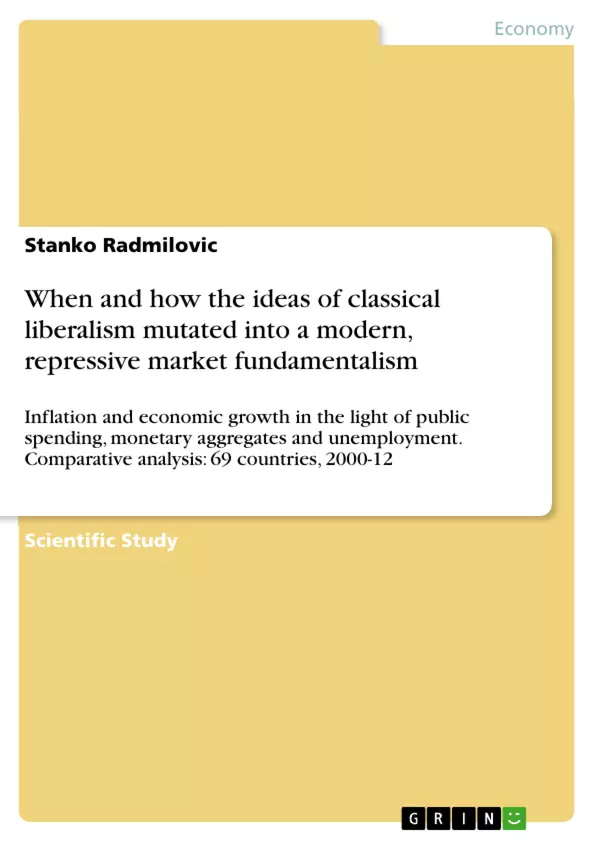We could say that the lower factography are specifically aimed to the performance analysis of the neoliberal doctrine of market fundamentalism: research the economic performance of those countries that the strictly applied, those who are forced to do so and those that implement various heterodox modality.
Prof. dr Stanko Radmilovic
When and how the ideas of classical liberalism mutated into a modern, repressive the market fundamentalism
Inflation, economic growth, in the light of public spending, monetary aggregates and unemployment - Comparative factography with brief preliminary potentiation - 69 countries, 2000-12
We could say that the lower factography are specifically aimed to the performance analysis of the neoliberal doctrine of market fundamentalism: research the economic performance of those countries that the strictly applied, those who are forced to do so and those that implement various heterodox modality.
It will be useful, even necessary to present the to readers a few quotes / views from the emphasis on the what's in them have an impact on the determination to formulate preliminarnie reviews and makes suggestions more complete, deeper analysis.
Let us start with a quote that, I believe, best expresses the idea, the root from which sprang the doctrine of market fundamentalism in the applied sense. Quote dates from a later period of time when Hayek and others affirmed the concept and theory of economic liberalism embodied in the famous phrase Laissez faire et laissez passer..
Perhaps to the surprise of many, I have in mind a much less "overhyped" views of Milton Friedman. Why the Surprise? Well, because he is better known as the creator of monetarism, "Chicago School" monetarist counter-revolution against the "Keynesian revolution". In fact, strengthens the idea that Kenes views about money has implicaton Which are proinflation.
But here I think of a much broader and far-reaching issues that can be seen from the following quote (emphasis is mine):
"Different types of structural disorder and inelasticities may come into play and prevent the achievement of the long-term hypothetical position of equilibrium under conditions of full employment ; dynamic changes in technology, resources, and social and economic institutions can continually change the characteristics of the equilibrium position, however, there is any fundamental 'deficiency in price system' that caused unemployment to be a natural consequence of an efficient market mechanism. This (Keynes, ed. RS) setting has played a significant role in recruiting many economists to Keynesianism, particularly the large number of reformers, social critics and radicals were convinced that there is something fundamentally wrong in the capitalist 'system' ... "
Milton Friedman, Teorija novca i monetarna politika, prevod, Beograd, 1973, str. 161. i 162.
The same opinion on Friedman's impact on the market-fundamentalist views expressed and Nobel laureate Stiglitz. He says "that Friedman and his followers contributed to the causes of the current turmoil," The Chicago School bears the responsibility for intellectual grounding a notion that markets are capable to self-regulation", which we presented in a short article on this site Kraj dominacije monetarizma?
Često postavljana pitanja
O čemu govori ovaj dokument?
Ovaj dokument je analiza ideje da je klasični liberalizam mutirao u moderni, represivni tržišni fundamentalizam. Uključuje komparativnu faktografiju sa brief potentiation, fokusirajući se na inflaciju, ekonomski rast u svjetlu javne potrošnje, monetarne agregate i nezaposlenost u 69 zemalja u periodu 2000-2012.
Koje su ključne teze dokumenta?
Dokument istražuje ekonomske performanse zemalja koje su striktno primenjivale neoliberalnu doktrinu tržišnog fundamentalizma, onih koje su bile prisiljene na to, i onih koje su primenjivale različite heterodox modele. Naglasak je na analizi da li tržišni fundamentalizam donosi najbolje ekonomske rezultate, posebno u odnosu na inflaciju, ekonomski rast i nezaposlenost.
Ko je autor ovog dokumenta?
Autor dokumenta je Prof. dr Stanko Radmilović.
Koga autor citira i zašto?
Autor citira Miltona Friedmana i Josipa Stiglitza. Friedmanova perspektiva se koristi za ilustraciju korijena doktrine tržišnog fundamentalizma, dok se Stiglitzove kritike Friedmana koriste za naglašavanje odgovornosti "Čikaške škole" za intelektualno utemeljenje ideje da su tržišta sposobna za samoregulaciju.
Šta je "tržišni fundamentalizam" prema ovom dokumentu?
Tržišni fundamentalizam se ovde razmatra kao ideologija koja veruje da je tržišni sistem, bez fundamentalnih nedostataka, najbolji i da bi stoga trebalo da donese najbolje ekonomske rezultate u razvijenim zemljama. Dokument nastoji da ispita ovu ideju kroz empirijsku analizu.
Koja je svrha faktografske analize u ovom dokumentu?
Faktografska analiza se koristi za uporedjivanje ekonomskih performansi zemalja koje su primenjivale tržišni fundamentalizam sa onima koje to nisu, sa ciljem da se utvrdi da li fiskalni i monetarni poremećaji imaju veći uticaj u zemljama koje se pridržavaju tržišnog fundamentalizma.
Frequently Asked Questions
What is the main focus of this document?
The document focuses on how classical liberalism mutated into modern neoliberal market fundamentalism, analyzing the economic performance of 69 countries between 2000 and 2012.
Who is the author of this analysis?
The analysis was written by Prof. dr Stanko Radmilovic.
What does "market fundamentalism" mean in this context?
It refers to the neoliberal doctrine that markets are capable of self-regulation and that price systems have no fundamental deficiencies that cause unemployment.
Which economic indicators are compared in the study?
The study compares inflation, economic growth, public spending, monetary aggregates, and unemployment rates across various countries.
Why does the author cite Milton Friedman?
Friedman is cited as a key intellectual founder of monetarism and the idea that markets are self-regulating, which laid the groundwork for market fundamentalism.
What is Joseph Stiglitz's perspective mentioned in the text?
Stiglitz criticizes the Chicago School and Friedman for providing the intellectual grounding for the notion of self-regulating markets, which he links to modern economic turmoil.
- Citar trabajo
- Professor Dr Stanko Radmilovic (Autor), 2013, When and how the ideas of classical liberalism mutated into a modern, repressive market fundamentalism, Múnich, GRIN Verlag, https://www.grin.com/document/267237



